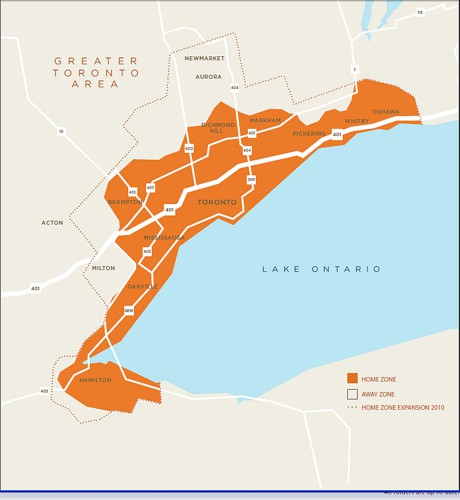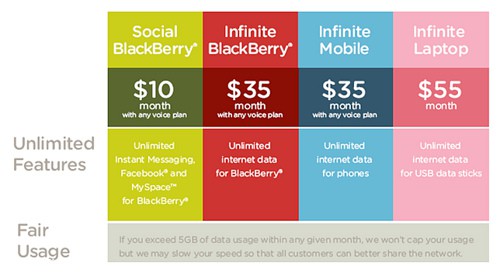
Wind Mobile uses "home zones" as their version of "in network" calling. Placing calls outside of your home zone is akin to "roaming" and can incur additional costs. Here is their service area in the metro GTA (Toronto-Hamilton).
The Canadian Radio-television and Telecommunications Commission has been overruled in an upset decision by the Harper government to admit new competition into Canada’s mobile phone marketplace. Earlier this fall, the CRTC denied a license to Globalive to begin mobile service under its Wind Mobile brand, agreeing with objections from incumbent providers Bell, Rogers, and Telus that the company was not sufficiently “Canadian enough” in its ownership to operate legally in the country. The CRTC decision upset many consumers who saw the regulatory body overprotecting the interests of the country’s three large mobile providers, effectively keeping competition out of Canada.
Canada’s version of the FCC ruled that because the Toronto-based company received most of its funding from Naguib Sawiris, an Egyptian billionaire that runs Egypt’s telecommunications provider Orascom, it disqualified Globalive from doing business in Canada. Cell phone providers in Canada must be majority owned by Canadian citizens.
Apparently the decision was so egregiously wrong, the Harper government overturned it on December 11th. Industry Minister Tony Clement said a government review of Globalive found the company did meet Canadian ownership requirements and reversed the CRTC decision effective immediately.
The Harper government’s direct intervention in the Globalive matter rocked Canada’s existing mobile providers.
“If Wind is Canadian, then so was King Tut,” Michael Hennessy, head of regulatory affairs for Telus, wrote on his Twitter page. “When you have no effective opposition party, you can make the rules you want.”
Rogers has repeatedly insisted there is no room for a fourth player in Canadian mobile, claiming there isn’t enough business to go around. Stockholders apparently agreed and shares of all three incumbents dropped when the news broke that Wind Mobile was on the way in Toronto and Calgary in as little as a week. Indeed, some analysts predict Globalive’s entry could force two of the existing carriers to merge — most likely Bell and Telus.
Rogers CEO Nadir Mohamed: “There’s no question in my mind that Canada cannot support more than three national facilities-based players,” he said in an interview with Bloomberg News the day before the government decision. “It’s inconceivable to me.”
“We think Globalive clearly does not meet the requirements for Canadian control,” Bell officials said in a statement. “We’ll be taking a close look at the reasoning behind this decision.”
Canadian consumers are excited about the arrival of competition in a marketplace with three providers charging essentially identical high pricing for mobile service.
Wind Mobile could dramatically change the the entire business model of Canada’s cell phone marketplace because most of its plans offer flat rate service for Canadian customers with no overage fees. It also does away with the nickle-and-dime fees consumers hate, with no charges for “system access,” “911,” and other non-government-imposed fees and surcharges. Wind doesn’t even charge for incoming text messages or received long distance phone calls. That means text spam doesn’t cost you anything beyond irritation.
In return for not subsidizing the cost of your phone, the company doesn’t compel subscribers to remain on lengthy service contracts. That Blackberry Bold 9700 that costs $199 on AT&T or T-Mobile’s network in the United States costs $450CDN from Wind Mobile, but no two year contract is required.
The only downside? Wind Mobile’s network is very limited at present to Toronto and Calgary, and while service is available throughout Canada, using it will incur roaming charges around 25 cents per minute. Most early Wind Mobile customers will likely be those who don’t roam too far from home because of these limitations.
[flv width=”640″ height=”388″]http://www.phillipdampier.com/video/CBC Coverage Wind Mobile 12-11-09.flv[/flv]
CBC Television ran extensive coverage of the government decision to admit Globalive into the Canadian mobile marketplace. We’ve combined several reports into a single clip that explores consumer reaction, the government’s logic in permitting Wind Mobile to start service, as well as the discontent from existing providers who feel the decision is unfair. (12/11/09 – 21 minutes)
[flv width=”512″ height=”308″]http://www.phillipdampier.com/video/CTV Coverage Wind Mobile 12-11-09.flv[/flv]
CTV News also covered the story, and included a more extensive review of what consumers can expect from the deal. (12/11/09 – 5 minutes)
[flv]http://www.phillipdampier.com/video/Global CRTC Decision Lets Wind Mobile In 12-11-09.flv[/flv]
Global Television led its newscast with the story on December 11th, and included a pouting Telus representative. (2 minutes)
More video coverage can be found below.
Wind Mobile Pricing & Features (provided by Wind Mobile, all prices in Canadian dollars)
Handsets / Devices:
BlackBerry Bold 9700 …… $450
HTC Maple ………………….. $300
Samsung Gravity 2 ……….. $150
Huawei U7519 ……………… $130
Huawei E181 data stick…….$150
Here’s what we don’t have:
- No system access fees
- No 911 fees
- No activation fee
- Never a charge for incoming texts
- No charge for incoming long distance calls
- No difference between plans for postpaid and prepaid
- No contracts. Our Customers stay with us because they want to, not because they have to.
What we do have:
- Nation-wide coverage with a domestic roaming partner
- Unlimited calling (incoming and outgoing) in the GTA and Calgary to start, followed by Edmonton, Vancouver and Ottawa in early 2010
- Unlimited WIND to WIND calling across Canada included on all plans
- Unlimited province-wide calling on the $35 plan
- Unlimited Canada-wide calling on the $45 plan
- Call control included on all plans (missed call alerts, caller ID, call forward, call waiting)

Wind Mobile's Voice & Text Plans

Wind Mobile's data plan has a 5GB per month "fair access policy" limit, similar to that offered by Cricket Wireless. Exceed it, and the company reserves the right to throttle your speeds until the month is up.
Watch more video coverage below.
… Continue Reading


 Subscribe
Subscribe







